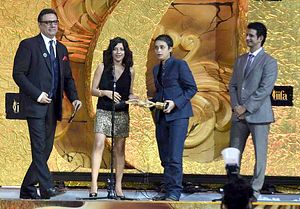Zoya Akhtar is one of the few female directors in the male-dominated Hindi film industry. Riding on two commercially successful films, Zindagi Na Milegi Dobara (ZNMD) and Dil Dhadakne Do (DDD), she has emerged as a prominent face in the industry. Her films trumpet a new wave of independent women in Hindi commercial cinema. With her unconventional female leads, Zoya is finding firm footing in an industry notorious for its sexist projections of women.
Challenging the stereotypical representation of women in Hindi films, Zoya employs fresh ways of representing women on the screen. Her films reshape female portrayals in Hindi commercial cinema in subtle but powerful ways. Zoya transforms some of the most common avenues of exhibiting women as sexual objects — such song and dance sequences, scenes at ocean beaches, and women in professional spaces — into scenes of female empowerment.
Zoya Akhtar’s movies are not about women. They are not, to use the cliche, women-centric. Women in her films don’t fight villains or chase goons; they are ordinary women living independent lives. Their independence stems from their professions, from what they do, and Zola’s films don’t meddle with her female characters’ careers. Ordinarily, in commercial Hindi films a heroine’s professional space is encroached upon in myriad ways, mostly by her love affair with the hero. So we see Sushmita Sen’s chemistry class in the film Main Hoon Na suddenly turning into romantic setting where she sings, dances, and starts a romance with Shahrukh Khan. In Swades, a more subtle romantic scene between Gayatri Joshi and Shahrukh Khan also takes place in a classroom.
By sharp contrast, a woman’s professional space is fiercely guarded in Zoya’s movies, sometimes overtly. Farah’s (Anushka Sharma) romance sequences in Dil Dhadakne Do (DDD) with Kabir Mehra (Ranveer Singh) are carried out under the constant shadow of her professional commitments. Her dates and meetings are dictated by what is allowed by her professional contract with her employer.
Zoya’s respect for her actresses’ professional screen space becomes quite marked when contrasted with other films. Deepika Padukone in Happy New Year (HNY) and Katrina Kaif in Zindagi Na Milegi Dobara (ZNMD) both play instructors, and their characters’ professions are important for both films. In NHY, the protagonist has a scheme to steal diamonds from the Atlantis Palm hotel, but his team can’t pull it off without participating in the dancing contest — for which they need training from Deepika’s character. Likewise, the film ZNMD cannot realize its theme of a life-changing journey without Katrina, playing a scuba diving instructor, becoming a catalyst for personal growth in the hero’s life.
Despite the importance given to the characters’ professions, both films treat the professional spaces very differently. While in one film the heroine’s profession is used to play out a trite male sexual fantasy, Zoya’s film strictly disallows any such intrusion, maintaining the sanctity of the character’s career. For the heroine in HNY, her choice of bar dancer as a profession provides an opportunity to convert her professional space into a male fantasy-land where actress Deepika Padukone is itemized, each part of her body listed to form a perfect item number. The dancing instructor is introduced while scantily dressed, swinging her hips to a raunchy song — annihilating any image of her as an instructor.
On the contrary, another equally sexualized commercial Hindi cinema actress, Katrina Kaif, transforms into a girl next door when introduced as a scuba diving instructor in the film ZNMD. Casually dressed, she professionally shakes hands with the three male leads of the film, who have come to learn scuba diving from her. Unlike the typical Hindi masala movies, Katrina’s scuba diving instruction sessions remain truly professional and don’t turn into an item number or a romance sequence with the hero, as one would usually expect in a Hindi movie. She is strongly projected as the instructor throughout the film, and so viewers associate her with a profession.
One senses a constant attempt by Zoya’s actresses to break free from the sexist mold usually allotted to heroines in Hindi films. In most films the two favorite arenas of Hindi commercial cinema the beach and the dance floor are constantly used to fully display the female body in order to satiate the erotic male gaze. But Zoya desexualizes these spaces and thus subverts standard tropes in her films.
Anushka Sharma’s dance sequence in the song “Girls Like to Swing” in DDD could be seen as a subversion of the “item number” popular in commercial Hindi cinema. It matches the spectacle of an item number but upend everything else, including the lyrics. Penned by one of the most respected lyricists of contemporary Hindi cinema, Javed Akhtar, the song appears to be a conscious take on the male-centric lyrics of contemporary item numbers. While the titillating lyrics of contemporary item songs focus on male sexual desires, Akhtar’s lyrics turns the spotlight on what the girls desire. The sparkling, loose dresses worn by the actress and other dancers are in complete contrast to the revealing, body-hugging garb typically worn in item numbers. There are no close-up shots on body parts or suggestive dance moves.
In the same way, another pinup girl of Hindi commercial cinema, Katrina Kaif, is filmed at the beach, but not in a swimsuit. Instead we see her giving scuba-diving instructions while fully-clothed or in a scuba suit. The focus never shifts to her body, and while her harmless flirtations add fun to the scenes they never sabotage her instructions.
Even while working within the boundaries of commercial Hindi cinema, Zoya Akhtar’s movies subvert the commercial, stereotypical projection of women by playing with and toppling mainstream sexist elements. In each of her films, there is an attempt to free women from their roles of playing to male sexual fantasies and assign them more meaningful roles.
Deepti Singh Apte teaches communication at a suburban college in Mumbai, affiliated to University of Mumbai.

































